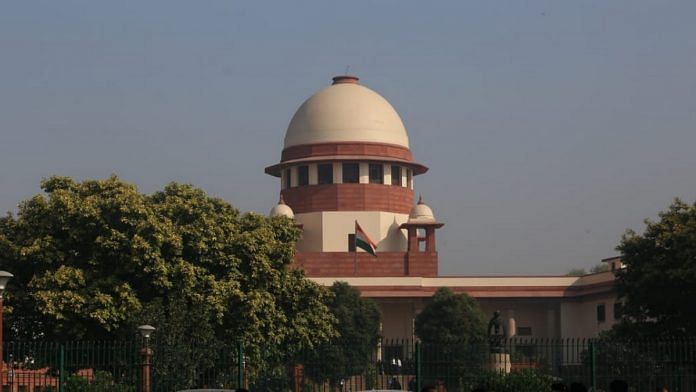New Delhi: The Supreme Court gave a clean chit to the Narendra Modi government Thursday and dismissed a batch of review petitions seeking a probe into the purchase of 36 Rafale fighter jets from French company Dassault Aviation. The bench delivering the verdict comprised of Chief Justice of India Ranjan Gogoi, Justice S.K. Kaul and Justice Joseph.
Justice Kaul wrote the majority opinion of the bench, which asserted that there were no grounds for review of the court’s 14 December 2018 judgment that had dismissed a plea challenging India’s agreement with France to buy the fighter jets.
But in a separate judgement, Justice K.M Joseph said the verdict will not stand in the way of the CBI taking lawful action on the petitioners’ complaint, provided the agency gets approval under the Prevention of Corruption Act.
The court also dropped contempt proceedings against Congress leader Rahul Gandhi for his attribution of the “chowkidar chor hai” remark to the Supreme Court. The former Congress president had made the remark over the Rafale controversy, alleging corruption on the part of Prime Minister Narendra Modi.
Also read: Rahul Gandhi says Supreme Court verdict on Rafale deal opens ‘huge door’ for probe
‘Original judgment won’t stop CBI’
Joseph specifically dealt with the argument that the court, in the impugned judgment, had not followed the mandate of the 2013 Constitutional bench verdict in the Lalita Kumari vs Government of Uttar Pradesh and others.
In the Lalita Kumari case, the Supreme Court had held that registration of an FIR is mandatory under Section 154 of the Code of Criminal Procedure if the information discloses commission of a cognisable offence and no preliminary inquiry is permissible in such a situation.
Joseph asserted that the review petitioners — advocate Prashant Bhushan and former Union ministers Yashwant Sinha and Arun Shourie — had almost made a case for acting on the complaint. But they did not adhere to Section 17A of the Prevention of Corruption Act while filing the complaint.
According to Section 17A of the said Act, no police officer is permitted to conduct any inquiry or investigation into any offence by a public servant — where the alleged offence relates to any act by a public servant in discharge of her or his public functions — without previous permission from authorities.
Joseph, therefore, asserted that even if Lalita Kumari case is considered, the petitioners’ plea still fails due to absence of any approval for initiating inquiry. But he added that the judgment would not stand in the way of the CBI taking action on a complaint according to the law.
Pricing of jets should be judged by government
The top court also appears to have rejected the contention that the government bought overpriced jets. In its verdict last year, the court had steered clear of the pricing bit but in Thursday’s judgment the bench asserted that value of the fighter jets should be taken care of by an “internal mechanism”.
“On the perusal of documents we had found that one cannot compare apples and oranges. Thus, the pricing of the basic aircraft had to be compared which was competitively marginally lower. As to what should be loaded on the aircraft or not and what further pricing should be added has to be left to the best judgment of the competent authorities,” it observed.
No grounds for review
Calling it an unfair submission, the court also rejected the petitioners’ argument that the judiciary had “prematurely” reviewed the government’s contract. It asserted how all advocates had earlier made elaborate submissions on several aspects.
The court especially highlighted the fact that petitioners decided to invoke the jurisdiction of the court under Article 32, despite knowing its limitations under the said provision.
Rejecting the review petitions, it finally said: “We are, thus, of the view that the review petitions are without any merit and are accordingly dismissed, once again, re-emphasising that our original decision was based within the contours of Article 32 of the Constitution of India.”
Also read: SC dismisses petitions seeking Rafale probe, drops contempt case against Rahul Gandhi
Gandhi needs to be careful
In dropping the contempt case against Gandhi, the court noted that it was “unfortunate” that the then Congress chief had made those statements without reading the order himself.
The matter, it added, was “compounded” by a 20-page affidavit with a large number of documents annexed by him. However, his second affidavit rendering an unconditional apology saved the day for him.
The court then dropped the contempt proceedings against Gandhi, while asking him to be careful in the future.
“We do believe that persons holding such important positions in the political spectrum must be more careful. As to what should be his campaign line is for a political person to consider.”
Also read: Ayodhya to Rafale, the 6 major verdicts CJI Gogoi will have to deliver in less than 10 days




If the government has paid higher price it can only be because of the incompetence ( Do not know if it is crime) or because of vested interest ( if proven, it is crime) It appears as of now there is no material to indicate corruption or vested interest. If any material surfaces in future surely no past judgement can prevent investigation, that is obvious even without being said in the judgement.
Two ex-ministers, a renowned lawyer supported by a major media house, all with great experience in successfully exposing financial wrongdoings did not make a sound case but exposed themselves to motives other than just going after the corrupt.
It looks like the matter rests for now, unless the investigative journalists come up with solid indications of financial wrongdoings.
What is this joke? The minority judge’s judgment is just an opinion, it has been overridden by the majority judgment. How can a part of the minority judgment be operational?